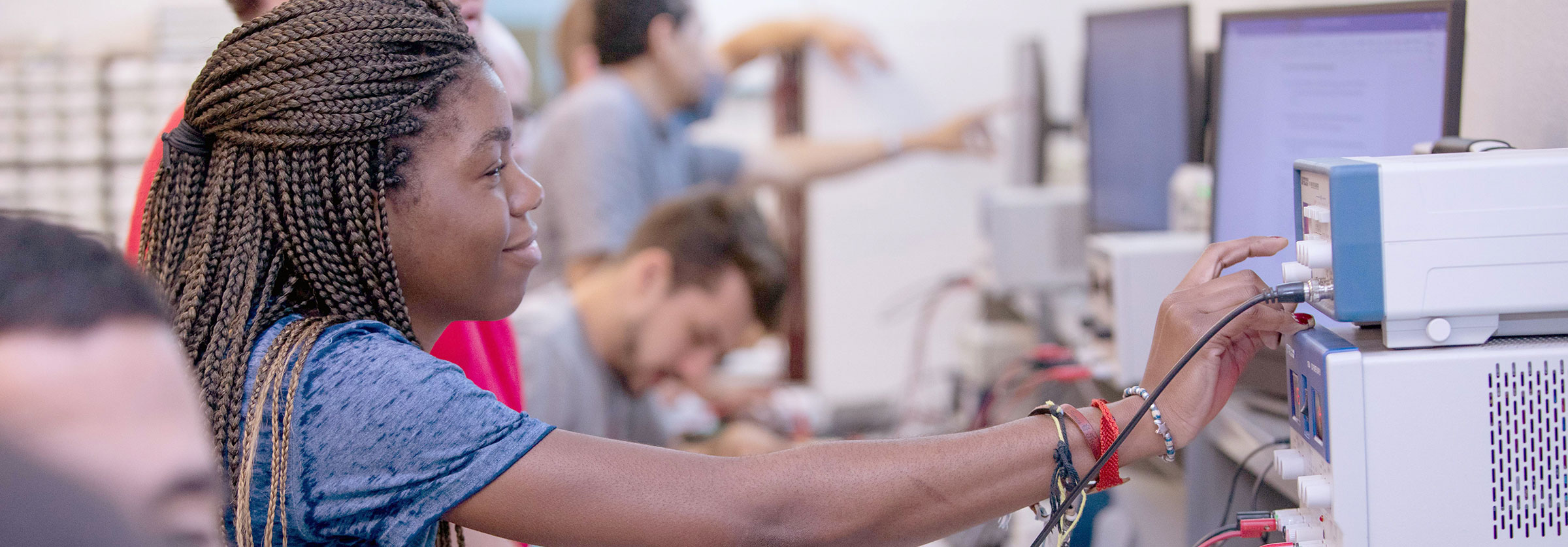
Wake Technical Community College electrical engineering student.
June 2, 2022 | By Chris Dede
Some skills can be learned and coached, but not taught. Instruction about skills like leadership, creativity, and self-directed learning reduces them to a formulaic recipe that the learner follows, without mastering the essential capabilities of recognizing the unique characteristics of a particular situation and of improvising an approach suited to the occasion. Instead, acquiring situationally nuanced skills necessitates learning through doing and reflection: experiential learning.
Instructors can convey the menu of available strategies but cannot teach how to determine what strategy to use when, given the richness and depth of contextual factors. This is why business schools use the case method: Students gain vicarious experience in confronting complex situations and developing their capacity to analyze all the factors involved in a leadership decision. Mentors and coaches help students to build their skills, but do not directly teach a one-size-fits-some process.
Self-Directed Learning is Aided by Personalization
To be self-directed, learners must share agency in shaping their learning: having some choice over what, how, and when they learn. Each individual’s decisions about how to personalize their learning will draw on their knowledge base, life experience, and languages/cultures. To leverage those strengths and enable self-direction, both developers of learning experiences and instructors who guide learners through them should offer alternative experiences and paths to build knowledge and skills.
Frequent diagnostic assessments that include real-time guidance about appropriate individual interventions are essential for the mentors who guide this process, as well as for the learners who are developing their skills. Imagine a doctor who has only two forms of feedback on whether her treatments are helping patients. First, she can take direct measurements (e.g., body temperature), but no one collects this data when she is not with the patient, and she has no way to order repeated lab tests (e.g., changes in liver function). As a result, she has little diagnostic information on which to base her interventions. Second, if a patient dies, the doctor can get an autopsy report on what killed them. Third, if they get well and leave the hospital, she can get a medical workup about their condition on release. However, all of these assessments come far too late to improve treatment. Without multi-dimensional, frequent, longitudinal, diagnostic data that enable formative shifts in her therapies, this doctor is severely handicapped in curing her patients. Of course, this is the difficult challenge teachers face every day when the primary method of evaluation is summative tests. Even worse are the difficulties this creates for students, who have few ways to assess their attempts to acquire self-directed learning skills (SDL).
As for measuring success by high-stakes tests, as described in Rose Luckin’s 2018 book, Machine Learning and Human Intelligence, such an approach prepares students for jobs deskilled by artificial intelligence (AI). Instead, students should learn what AI cannot do, preparing themselves for roles upskilled though intelligence augmentation (IA) in which people working with smart machines accomplish more than either can unaided.
SDL Inculcates Crucial Dispositions and Learning Strategies
We and our children face a world-wide interdependent civilization shaped by economic turbulence from artificial intelligence and globalization, climate change, and advanced social and immersive media. To meet these challenges, learners must acquire essential socioemotional dispositions: resilience, perseverance, self-regulation, collaboration, self-efficacy, growth mindset, conflict resolution, and forging opportunity from uncertainty. Opportunities for agency and personalization are key in developing these dispositions, which draw their power from internal beliefs rather than external guidance.
Beyond knowledge, skills, and dispositions, agile learning strategies based on cognitive science, neuroscience, and the learning sciences are important. Learners also must master strategies to help transfer what they learn in school to its application in the real world.
In summary, our graduates must continuously upskill to master the situationally nuanced skills AI cannot do, using SDL as the engine of gaining the knowledge, skills, and dispositions they need for a turbulent, uncertain future. These capabilities are essential in inventing new models for a global civilization that transcends the mistakes and injustices of our recent history.
Chris Dede is the Timothy E. Wirth Professor in Learning Technologies in the Learning Design Innovation & Technology Program at the Harvard Graduate School of Education. He is a Collaborative advisor and provides advice and support on Collaborative research and capacity building activities.